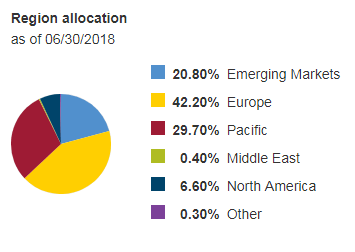

Back in 2017, a strange thing happened in the US stock market. For the first time in history, the number of index funds actually surpassed the number of stocks.
In other words, the collective baskets of stocks outnumbered the actual number of stocks those same baskets were holding.
How’s that for a head spinner?
We won’t get into the technicalities about how that weird trivia is possible, but it does highlight an important point. With over 3,000 stocks in the US market alone, that’s a TON of index funds!
Which means even if you wisely decide to listen to Warren Buffett, who says index investing is the best investing strategy for almost everybody, you’re only half way there. With thousands upon thousands of index funds, choosing which fund to put your money into can be a dizzying experience.
So, how about we narrow that list of thousands down to my 5 favorite?
A couple of rules upfront:
1) I’m admittedly biased towards Vanguard Funds. They don’t pay me anything to hawk their offerings like a fanboy, but I am convinced they’re the best choices for nearly all investors. I have my reasons.
2) When comparing expense ratios, I’ll be using Vanguard’s “admiral shares” which (usually) means you have over $10,000 invested in the fund. If you have less than $10,000 to invest, your money will go into Vanguard’s “investor shares” class, which just means you’ll pay a slightly higher expense ratio until your investment inevitably grows above $10K. (You can also invest in the ETF equivalent to avoid the higher fees. See How to decide between an ETF and Mutual Fund)
And 3) I’m not an investment professional, and this should not be considered investment advice. It’s just one guy’s opinion. If you invest your life’s savings and lose those savings plus the shirt on your back, don’t sue a blogger who’s just trying to help people for free. You won’t get very far, and besides, you need to save what’s left of your money anyway.
With that out of the way, let’s find some awesome index funds!
1) Vanguard 500 Index Fund (VFIAX)

- Stock Ticker: VFIAX
- Asset Class: Large-cap US stocks
- Expense Ratio: 0.04%
The Granddaddy of all index funds, Vanguard’s S&P 500 Index Fund was literally the first index fund ever created. Plus, this is the index fund Warren Buffett likes to shout out in his annual letters. So, it’s got that going for it.
My advice… couldn’t be more simple: Put 10% of the cash in short-term government bonds and 90% in a very low-cost S&P 500 index fund. (I suggest Vanguard’s.)” –Warren Buffet, 2014 Letter to Shareholders
If that doesn’t show enough of Buffett’s love for the fund, he eventually put his money where his mouth was. In 2007, he bet $1 million dollars that no hedge fund manager could outperform Vanguard’s 500 Index Fund. (And in 2017, Buffett officially won the bet; VFIAX handily outperformed a carefully selected basket of hedge funds, returning 7.1% per year versus just 2.2%)
So, what is this fund? And why does Buffett love it so much?
VFIAX invests in the 500 largest US companies, aka the “S&P 500.” Buy 1 share of VFIAX, and congrats! You’re now the proud owner of Apple, Microsoft, Amazon, and 497 of the other largest companies in the United States. And since those 500 companies make up approximately 75% of the US stock market, that’s significant exposure.
Aside from Buffett’s optimistic view of the US economy, there’s another reason he loves this fund so much – its rock bottom fees.
VFIAX rocks an expense ratio of just 0.04%, which is insanely cheap. (Vanguard likes to claim that price is 96% lower than the average expense ratio of similar funds.) And since fees are half the battle when it comes to investing, this is a big deal.
Similar Great Choices:
- Schwab S&P 500 Index Fund (SWPPX)
- Fidelity 500 Index Fund (FUSEX)
2) Vanguard Total Stock Market Index Fund (VTSAX)

- Stock Ticker: VTSAX
- Asset Class: Large-cap, Mid-cap, and Small-cap stocks
- Expense Ratio: 0.04%
My personal favorite index fund. Although, before I give myself too much credit as a creative investor, it’s worth reminding everyone that this fund holds a whopping $701.2 billion dollars in addition to my puny $0.0000001 billion contribution.
The popularity of Vanguard’s Total Stock Market index fund is understandable. VTSAX takes the same concepts of the S&P 500 index fund and expands on them.
Like the 500 index fund above, this fund invests in the 500 largest US companies, plus the rest of the US stock market. So not only does an investor get that “large-cap” exposure, but they’ll also benefit from exposure to medium and small companies as well. All told, the fund invests in a whopping 3,654 companies.
In theory, the addition of the “rest” of the US market should boost returns and volatility slightly, since those smaller companies carry more risk (and more growth potential) than the mature stalwarts in the S&P 500. In practice, we do see this effect… slightly.
Taking the 10 year return as an example, the Total Stock Market Index returned 10.33% compared to the 500 Index, which returned 10.16%.
VTSAX also sports Vanguard’s rock bottom expense ratio of 0.04%.
Overall, VTSAX is so well diversified that it’s a staple of easy to manage portfolios everywhere, and some investors (including this guy…) are even comfortable putting all of their after-tax investments into VTSAX and calling it a day.
Similar Great Choices:
- Fidelity ZERO Total Market Index Fund (FZROX)
- Schwab Total Stock Market Index Fund (SWTSX)
3) Vanguard Total International Stock Index Fund (VTIAX)

- Stock Ticker: VTIAX
- Asset Class: International Large-cap, Mid-cap, and Small-cap stocks
- Expense Ratio: 0.11%
Just about the only portion of the stock market not covered by the previous Total Stock Market Index Fund is the international segment. And for the investor looking to add some of that missing international exposure to their portfolio, Vanguard’s Total International Index Fund (VTIAX) is a perfect choice.
Similar to the Total Stock Market Index Fund, the Total International Fund applies the same mega-diversification to the international market. In total, this fund invests in 6,349 companies all across the world. Companies are represented from developed countries, like the U.K., Japan, Canada, and Germany, as well as “emerging” countries, like China, India, and Brazil.
Here’s a great breakdown from Vanguard on the portfolio’s holdings by region:

While I wouldn’t personally put all my eggs in the international basket, an index fund like VTIAX is a great option for investors looking to supplement their existing portfolio with some international flavor.
What if Canada strikes liquid gold, and their oil production catapults them to a level of growth that blows away the US Market? What if a few Japanese companies develop AI technology so valuable, the country spawns the world’s next Apple, Google, or Microsoft? Or what if Donald Trump’s hair triggers a nuclear meltdown in the US economy, and soon we all wake up to find ourselves speaking Chinese?
A little far-fetched? Probably, but in these instances, some international exposure can offer a solid Plan B for your savings.
This fund’s expense ratio of 0.11% is a little higher than others on this list, but international indexes typically cost a little more to manage. And like all Vanguard funds, these expenses are still minuscule enough not to weigh you down, and are still some of the lowest in the industry.
Similar Great Options:
- Fidelity ZERO International Index Fund (FZILX)
- Schwab International Index Fund (SWISX)
4) Vanguard Total Bond Index Fund (VBTLX)

- Stock Ticker: VBTLX
- Asset Class: Bonds
- Expense Ratio: 0.05%
As investors, we’re offered a head-spinning number of different types of bonds. Taxable bonds, tax exempt bonds, treasury bonds, investment grade corporate bonds, long term investment grade bonds, junk bonds… tired yet?
Before I lose you, there’s good news! If you’re under the age of 60, you don’t need to bother with any of that stuff.
Vanguard’s Total Bond Index Fund to the rescue!
VBTLX is one of the most diversified bond funds available. The fund offers broad exposure to US bonds, with roughly 30% of the fund invested in corporate bonds and 70% in government bonds of varying lengths.
If you’re investing for a longer time frame, or are still in the accumulation phase and racing towards financial freedom ASAP (like yours truly) bonds probably aren’t the best route to go. For reference, I’ve only got less than 5% of my net worth in bonds. (Full disclosure, this is less than what’s recommended for my age, which would be somewhere between 10-30%. I’m comfortable with a lower percentage because I have a pretty high risk tolerance, and I probably won’t touch my investment’s principal for the next several decades.)
BUT, for investors with a shorter time frame, lower risk tolerance, or even investors who just want a slightly better option than a savings account losing money to inflation each year, VBTLX is a decent choice to park cash and earn a little bit of income in the process.
Plus, there’s a decent chunk of research which shows that a small amount of bonds in your portfolio can actually provide a better risk adjusted return, long term.
5) Vanguard Real Estate Index Fund (VGSLX)

- Stock Ticker: VGSLX
- Asset Class: Real Estate
- Expense Ratio: 0.12%
Want some exposure to the real estate market, but you don’t want to spend your nights and weekends answering tenant calls and unclogging toilets? Vanguard’s Real Estate Index has your back.
Vanguard’s Real Estate index invests in Real Estate Investment Trusts, aka REITs. REITs are companies which invest in real estate ranging from everything from residential rentals, commercial real estate, public storage units, hotels, and everything in between.
By law, REITS have to distribute over 90% of their earnings to shareholders, which explains VGSLX’s somewhat higher fixed income yield of nearly 4% for the past few years.
As a homeless bum savvy renter, I enjoyed the real estate exposure from this fund for the past several years. Plus, since real estate is far less correlated to the overall stock market, VGSLX can provide a great source of diversification to the rest of my index funds.
6) Vanguard Wellesley Income Fund (VWINX)

- Stock Ticker: VWINX
- Asset class: Bonds and US Large-Cap Stocks
- Expense Ratio: 0.15% (with $50,000 investment) or 0.22 (with $3,000 minimum investment)
Vanguard’s Wellesley Income Fund is a unique offering in their lineup. It’s technically an actively managed fund, because the fund tries to maintain a balance of around 40% stocks and 60% bonds, and managers are given more discretion in how they can adjust that allocation. As such, the fund currently holds around 70 dividend paying stocks and over 1,000 various corporate and government bonds.
The Wellesley Income Fund states its goal as lowering volatility while providing steady income to investors. And on that front, the fund’s track record is incredibly impressive.
Since 1970, the fund has returned 9.70% per year. More impressive, the fund has been steady as a rock in that time. In its nearly 50-year history, VWINX has reported losses in only 6 of those years, and all were under 10%. (Just for comparison’s sake, the S&P 500 had 11 years of losses in the same time period, the largest being the nearly 40% correction during the financial disaster of 2008.)
As an actively managed fund, expenses are slightly higher, at 0.15% (and 0.22% if you don’t have the whopping $50,000 initial investment needed to get those lowest rates). Investors should also be careful, since the fund’s focus on income distributions will have you on the hook for owing more taxes than traditional stock market index funds.
In any case, for investors looking for steady income, or perhaps even those a little skittish of a potential market downturn, Vanguard’s Wellesley Fund is a legit choice.
Final Thoughts – You Can’t Go Wrong with Vanguard’s Best Funds
One thing that’s important to remember when you’re sorting through lists like this – there’s no such thing as “the perfect” index fund. As long as you’re sticking to something with sound diversification (and most importantly, a low expense ratio) you’ll be a-ok.
Once you’ve got those basics down (as all the funds in this list do) your most important decision becomes simply choosing the underlying asset type that best fits your goals.
In other words, it doesn’t make sense putting all your eggs into a bond fund if you’re hoping to take advantage of high growth rates over decades. Just like you shouldn’t put all your short term money into the S&P 500. Especially if a temporary 30% decline would cause financial disaster for you.
Instead, just match the type of assets with your own financial goals, and pick whatever fund you feel comfortable with. Isn’t that more manageable than starting with thousands of options?
But most importantly, just put your money in something, and you’ll be well on your way to investing like a pro.
Oh, and once you choose your funds, did you know Personal Capital gives detailed breakdowns of all your holdings? It’s my favorite way to track my investments.
**Disclosure: I am personally invested in VTSAX and VGSLX.
Last Updated: July 2019
Related Articles:


Appreciate the info! Sort of off topic, wanted to pick your brain on how taxes are paid on a Roth IRA conversion ladder. I know you pay taxes on conversion, but are those taxes taken out of the amount converted immediately, or would you have to write a big fat check to the IRS come tax time?
Some of the actual early retirees might be able to answer this question better. My understanding is it’s treated as ordinary income, meaning you’d owe come tax time.
No honorable mention for Fidelity’s zero cost funds?
Zero total market and Zero international were under the honorable mentions 2) and 3)
I just made a tool for displaying all the holdings of your index funds:
https://stocked.honeymoney.io
Nice blog. Learn a lot from your blog honestly. Thanks and i appreciate the content that you put out. Whats the difference between VTSAX and VTI?
Thanks!
VTI is just the ETF version of VTSAX.
See: How to decide between an ETF or mutual fund?
Are you saying the number of Index Funds has surpassed the number of stocks or the number of Mutual Funds has surpassed the number of stocks. Many people use the terms ETF, Mutual Fund, and Index Fund interchangeably and there is a big difference.
BTW, I am not suggesting you don’t know the difference. Your article shows clearly that you do. The opening statement is just a little unclear to me. I would have edited my initial comment. This platform doesn’t seem to allow that.
Great breakdown! I have a few of these Vanguard funds in my portfolio now, and I’m planning to add the Vanguard Real Estate Index Fund as well.
I did not realize there were that many ETFs. You provided a sold list of index funds. I own all of the except Wellesley fund. I would, however, consider that fund at retirement.
Wow, you really are a Vanguard fanboy! You should really take a deeper look at Fidelity’s index funds. Many have expenses as low or lower than Vanguard index funds.
Informative and well explained article. Great list of vanguard index funds. Thanks for sharing such an worth reading article.
Although the market is at an all time high do you continue to deposit into these funds without hesitation?
If you only have $10,000 to invest, do you recommend throwing all of it into an admiral fund to get the best expense ratio or dividing into three investor class ($3,000) for diversification?
Doesn’t matter a whole lot. Taking VTSAX as an example, you’re literally looking at a $10 difference in the first year between the admiral class and investor class.
Since all of Vanguard’s funds are so low fee anyway, admiral vs. investor class would only make a dent on really huge account balances.
Mr Money Wizard, I’d like to know what you think about VBIAX. Thanks!
Like pretty much every Vanguard fund, it’s fine. Best for novice investors. Similar to VWINX, the bond exposure means it’s more for those worried about smoothing the ride rather than maximizing growth.
The only two things to watch out for are: 1) the 60/40 allocation is fixed, even though your needs may change over time. (Why I recommend the three fund portfolio) and 2) It’s not super tax efficient because bond income is taxed at ordinary income rates.
Thanks a lot! :3
Hi Mr.Money Wizard,
I love your blog/and website. What is the value of VGSLX if you have to pay a $50 transaction fee each time?
Thanks, Scott.
Why would you have to pay a $50 fee?